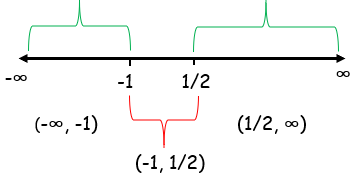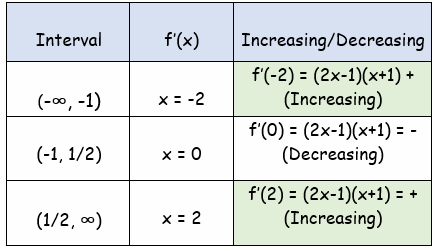FINDING LOCAL EXTREMA WITH SECOND DERIVATIVE TEST
The Second Derivative Test relates the concepts of critical points, extreme values, and concavity to give a very useful tool for determining whether a critical point on the graph of a function is a relative minimum or maximum.
Suppose that c is a critical point at which
f'(c) = 0
that f ′(x) exists in a neighborhood of c, and that f ′(c) exists.
Then f has a
- relative maximum value at c if f''(c) < 0 and
- relative minimum value at c if f''(c) > 0
- If f ''(c) = 0 , the test is not informative
Finding Concavity from Second Derivative
(i) If f''(x) > 0 on an open interval I, then f(x) is concave up on I.
(i) If f''(x) < 0 on an open interval I, then f(x) is concave down on I.
Find the local extrema for the following functions using second derivative test :
Problem 1 :
f(x) = −3x5+ 5x3
Solution :
f(x) = −3x5+ 5x3
f'(x) = -15x4 + 15x2
f'(x) = 0
-15x2(x2 - 1) = 0
x = 0 and x2 - 1 = 0
x = 0, 1 and -1
f''(x) = -20x3+30x
f''(0) = -20(0)3+30(0) ==> 0
f''(1) = -20(1)3+30(1) ==> 10 > 0 (local minimum)
f''(-1) = -20(-1)3+30(-1) ==> -10 < 0 (local maximum)
So, local maximum at x = -1.
Maximum value :
f(-1) = −3(-1)5+ 5(-1)3
f(-1) = 3 - 5 ==> -2
So, local maximum point is (-1, -2) and local maximum is -2.
So, local minimum at x = 1.
Minimum value :
f(1) = −3(1)5+ 5(1)3
f(1) = -3 + 5 ==> 2
So, local maximum point is (1, 2) and local maximum is 2.
Problem 2 :
f(x) = x logx
Solution :
f(x) = x logx
f'(x) = x(1/x) + log x (1)
f'(x) = 1 + log x
f'(x) = 0
1 + log x = 0
log x = -1
x = e-1
x = 1/e
f''(x) = 0 + 1/x
f''(x) = 1/x
f''(1/e) = e > 0 (local minimum)
Local minimum at x = 1/e
f(1/e) = (1/e) log (1/e)
f(1/e) = (1/e) log (e-1)
f(1/e) = (1/e) (-1)
f(1/e) = -1/e
So, local minimum is -1/e
Problem 3 :
f(x) = x2e-2x
Solution :
f(x) = x2e-2x
f'(x) = x2(-2e-2x) + e-2x(2x)
e-2x (-2x2+2x) = 0
e-2x (x-x2) = 0
x(1-x) = 0
x = 0 and x = 1
f''(x) = x(-1) + (1-x)(1)
f''(x) = -x + 1-x
f''(x) = 1-2x
f''(0) = 1 > 0 (Local minimum)
f''(1) = -1 (Local maximum)
|
Local minimum : At x = 0 f(x) = x2e-2x f(0) = 0 |
Local maximum : At x = 1 f(1) = 12e-2(1) f(1) = 1/e2 |
Local maximum = 1/e2
Local minimum = 0
Problem 4 :
For the function
f(x) = 4x3+3x2-6x+1
find the intervals of
(i) monotonicity
(ii) local extrema
(iii) intervals of concavity and
(iv) points of inflection.
Solution :
f(x) = 4x3+3x2-6x+1
f'(x) = 12x2+6x-6
f'(x) = 0
12x2+6x-6 = 0
6(2x2+x-1) = 0
(2x-1)(x+1) = 0
x = 1/2 and x = -1


The function is increasing on (-∞, -1) and (1/2, ∞), it is decreasing on (-1, 1/2).
f'(x) = (2x2+x-1)
f''(x) = 4x + 1
f''(x) = 0
x = -1/4
(-∞, -1/4) and (-1/4, ∞)
From (-∞, -1/4), we take -2
f''(-2) = -7 < 0 (Local maximum)
Concave downward on (-∞, -1/4).
From (-1/4, ∞) , we take 2
f''(2) = 9 < 0 (Local minimum)
Concave upward on (-1/4, ∞).
At -2 it changes from negative to positive, then it turns into maximum to minimum.
Local maximum :
x = -1
f(-1) = 4(-1)3+3(-1)2-6(-1)+1
= -4+3+6+1
= 6
Local minimum :
x = 1/2
f(1/2) = 4(1/2)3+3(1/2)2-6(1/2)+1
= (1/2)+(3/4)-3+1
= (2+3-8)/4
= -3/4
Point of inflection :
f(1/4) = 4(-1/4)3+3(-1/4)2-6(-1/4)+1
= -1/16 + 3/16 + 6/4 + 1
= (-1+3+24+16)/16
= 42/16
= 21/8
Point of inflection is (-1/4, 21/8)
Problem 5 :
f(x) = (1/2)x + sin x defined in the closed interval [0, π] has a critical point at x =
a) 2π/3 b) π/3 c) π d) 5π/6 e) 0
Solution :
f(x) = (1/2)x + sin x
To find critical point, we have to equate f'(x) to 0 and solve for x.
f'(x) = (1/2)(1) + cos x
f'(x) = (1/2) + cos x
f'(x) = 0
(1/2) + cos x = 0
cos x = -1/2
x = cos-1(-1/2)
π - π/3
= 2 π/3
So, the required critical point is 2 π/3.
Problem 6 :
the function is defined by g(x) = 4x3 - 3x2 for all real values of x has a relative maximum at x =
a) -1/2 b) 0 c) 1/2 d) 1/4 e) 1
Solution :
g(x) = 4x3 - 3x2
g'(x) = 4(3x2) - 3(2x)
= 6x2 - 6x
g'(x) = 0
6x2 - 6x = 0
6x(x - 1) = 0
x = 0 and x = 1
Finding the second derivative :
g''(x) = 6(2x) - 6(1)
= 12x - 6
When x = 0
g''(0) = 12(0) - 6
= -6 < 0 Maximum
When x = 1
g''(1) = 12(1) - 6
= 6 > 0 Minimum
So, relative maximum at x = 0, option b is correct.
Kindly mail your feedback to v4formath@gmail.com
We always appreciate your feedback.
©All rights reserved. onlinemath4all.com
Recent Articles
-
Digital SAT Math Problems and Solutions (Part - 150)
Apr 25, 25 11:46 AM
Digital SAT Math Problems and Solutions (Part - 150) -
AP Calculus AB Problems with Solutions (Part - 19)
Apr 24, 25 11:10 PM
AP Calculus AB Problems with Solutions (Part - 19) -
AP Calculus AB Problems with Solutions (Part - 18)
Apr 24, 25 11:06 PM
AP Calculus AB Problems with Solutions (Part - 18)
